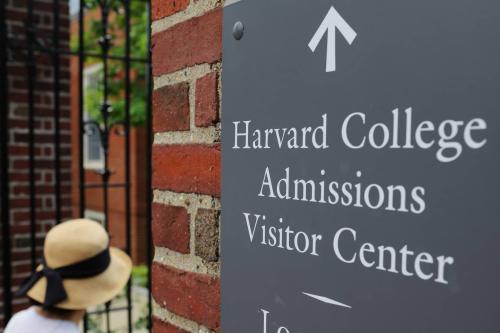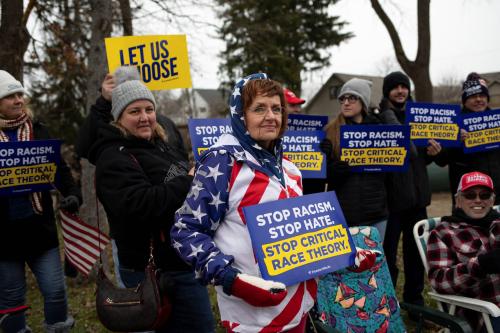2024
On July 22, the national security industrial working group held its third meeting, this one focused on the future human capital issues of the industry. Chancellor Michelle Rhee of the District of Columbia Public Schools system and Senior Fellow Darrell West of Brookings’ Governnance Studies Program helped kick off the discussion with presentations on the education system and immigration policy as they relate to the current and future science and technology workforce of the United States; Daphne Dador presented information from recent Aerospace Industries Association studies as well.
The general tone of the meeting was serious and deeply worried about where trends lines were headed. There was general concern about the state of science, technology, engineering, and mathematics skills in the United States—as well as the availability of specialized vocational skills. These were seen as not only necessary to the industry’s ability to build high quality weapons systems and deliver complex services, but also for the U.S. to simply maintain national economic competitiveness.
The United States ranks in the range of 20th to 30th in the developed world in its reading, math, and science scores in its public schools and, even worse, is on a downwards trajectory. Many major school districts have so many children in trouble, operating at grade levels below national standards, let alone international ones, that they are unable to raise these scores. The general problems reverberate even more, in that schools are thus also unable to nurture the higher-achieving students who need Advanced Placement classes and the like if they are to be science and technology leaders of tomorrow. Part and parcel of the problem is that teachers’ skillsets in these areas are in need of help as well.
The private sector has a vested interest in this issue and it was suggested could play a greater role in strengthening schools’ abilities to offer advanced, or even remedial, technical training, as well as volunteer mentoring and sponsorship of various challenges that draw students into the STEM fields. A challenge, though, has been teacher’s union resistance to outsiders.
Some concerns were questioned, such as whether in aggregate, science and tech workers in the U.S. have just as high unemployment rates as anyone else, suggesting no particular shortage of such abilities in general. Others pushed back, however, noting current and future challenges by defense firms in finding skilled labor, especially among U.S. citizens who can also attain clearance, and also noting the contrast of the huge endeavors at strategically spurring innovation made by places like Singapore, China, Poland, and Malaysia. The attractiveness of the STEM field for young adults choosing career paths was also raised as an issue. The lesser appreciation for scientists and engineers in modern American culture, and worries about a job’s long-term career stability, especially as compared with the excitement over science and technology matters during earlier periods (e.g., the space exploration period of the 1960s, the Cold War, etc.) were described as barriers to overcome.
Darrell West’s book Brain Gain, about which he spoke, proposes that, while education reform to deal with the above is certainly necessary, in order to address shortfalls in science and technology expertise among Americans, the United States must also rethink its immigration policies. Current immigration policy has not been strategic and the political debate on it has become deeply disappointing. Since 2005, only 6.5% of U.S. visas have gone towards high-skilled workers; comparatively, Canada set aside 58%, using its visas as part of a drive to fill needed skills gaps and aid long-term economic growth and competitiveness. Reorienting policy towards greater efforts to attract workers with needed skills should be prioritized. In addition to matters such as H-1B visas, it was also noted that the U.S. already makes a massive investment in many foreign PhDs (approximately $300,000 per graduate) that is presently lost. The idea was proposed of offering such foreigners who have obtained advanced science and technology degrees in the U.S. at American university or taxpayer expense automatic green cards to help induce them to stay on for the long-term. This and related ideas attracted considerable interest from the group.
Agenda
-
July 22
-
Moderator
 Michael E. O’Hanlon Director of Research - Foreign Policy, Director - Strobe Talbott Center for Security, Strategy, and Technology, Co-Director - Africa Security Initiative, Senior Fellow - Foreign Policy, Strobe Talbott Center for Security, Strategy, and Technology, Philip H. Knight Chair in Defense and Strategy @MichaelEOHanlon
Michael E. O’Hanlon Director of Research - Foreign Policy, Director - Strobe Talbott Center for Security, Strategy, and Technology, Co-Director - Africa Security Initiative, Senior Fellow - Foreign Policy, Strobe Talbott Center for Security, Strategy, and Technology, Philip H. Knight Chair in Defense and Strategy @MichaelEOHanlon -
Speakers
DDDaphne Dador Manager of Education and Workforce Development, California Space Education and Workforce InstituteMRMichelle Rhee Founder and CEO - Students First Darrell M. West Senior Fellow - Center for Technology Innovation, Douglas Dillon Chair in Governmental Studies
Darrell M. West Senior Fellow - Center for Technology Innovation, Douglas Dillon Chair in Governmental Studies
-

